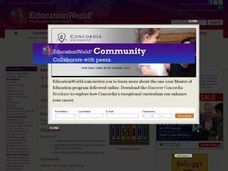Curated OER
Junk Food Jungle
Students become familiar with the nutritional value of foods advertised on television and in magazines. They discuss different types of foods and where snack food fits into a healthy diet. They categorize the foods they eat as healthy or...
Media Smarts
Bias in News Sources
As young consumers of media, it is important for high schoolers to explore concepts of bias and prejudice, and how they may be present in media. After discussing ideological messages that media can contain, individuals complete a warm-up...
Civil War Trust
Civil War Newspaper
One photograph can represent so much more than the images on the film. Eighth graders select a photograph from the Civil War era and conduct additional research based on the subject matter from the picture. Once they complete the...
Museum of Tolerance
Developing Media Literacy
To protect young people from questionable content, many schools limit access. This resource suggests that because learners can so readily avail themselves to unrestricted Internet access, it is vital for 21st century learners to develop...
iCivics
Propaganda: What’s the Message?
As class members progress through eight fully prepared learning stations, they will identify how bias is present in persuasive media, as well as differentiate among types of propaganda techniques like bandwagon propaganda and the use of...
Curated Video
Policy - The Community Guidelines
Following a site's community guidelines is just one step toward being an excellent digital citizen. After a brief introductory video, small groups come up with their own community guidelines and present their ideas to come up with a...
Curated Video
Detecting Lies & Harmful Links
Who and what can you trust online? How do you know? After viewing a pair of introductory videos on positive and safe online conduct, learners discuss the content and put it into practice during an online search activity about alien life.
Curated Video
What Makes YouTube Unique
Start off a unit on YouTube with an introduction to the service and all that it offers. Learners watch various video clips before participating in a brief discussion about YouTube. The plan includes an activity based around information...
Curated Video
Online Reputation and Cyber-bullying
Combat cyberbullying with information. During this plan, learners watch a couple of videos, consider online behavior scenarios, brainstorm long- and short-term consequences, and discuss how to react to bullying in order to build up to...
Curated Video
Reporting - Flagging
While it may feel like you can post just about anything on YouTube, that's not the case. Teach your class about flagging inappropriate content. Learners watch a demonstration, practice flagging, and answer questions about online content.
Curated OER
Alphabetize For A Reason
Learners organize information by using the alphabet. Students organize materials alphabetically. Learners alphabetize with the first, second and third letters of a set of words. Students discover applications for alphabetical order.
Curated OER
Animal Report
Fourth graders explore the variety of resources available to them at the library. They utilize many of these resources to create an animal report with a set criterium.
Curated OER
Don't Type To Strangers
Students create Web advertisements to protect young people from online predators. For homework, they write letters pitching their ads and analyzing their effect. They discuss their own use of the Internet and how to protect young people.














